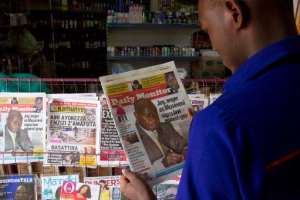
Kampala (AFP) - Uganda's tough new anti-gay law has sparked a "surge in human rights violations", with people being arrested, evicted or losing their jobs, and at least one transgender person has been murdered, campaign groups said Thursday.
Lesbian, gay, bisexual, transgender and intersex (LGBTI) people have "faced a notable increase in arbitrary arrests, police abuse and extortion, loss of employment, evictions and homelessness, and scores have fled the country," Human Rights Watch (HRW) and Amnesty International said in a joint report.
"At least one transgender person has been killed since the bill was signed, in an apparent hate crime," the report added.
President Yoweri Museveni in February signed a bill that calls for "repeat homosexuals" to be jailed for life, outlaws the promotion of homosexuality and obliges people to denounce gays to the authorities.
The law drew international condemnation, with US Secretary of State John Kerry likening it to anti-Semitic legislation in Nazi Germany.
Critics have said Museveni signed the law to win domestic support ahead of a presidential election scheduled for 2016, which will be his 30th year in power.
At least 17 people had been arrested since parliament passed the bill in December on "allegations of consensual same-sex conduct with other adults or, in some cases, simply on the suspicion of appearing to be LGBTI," the groups said.
Most have since been released without charge, some after paying bribes, the groups said. Others said they were sexually assaulted in custody, and at least one was forced to undergo anal examinations as police sought to prove he was gay.
- 'We are afraid' -
One week after Museveni signed the law, a transgender sex worker in Kampala was brutally attacked, dying days later from "cuts on the body and in the anus, apparently from a broken bottle", the report read.
"We were afraid if we told the police, they'd arrest us, because we're gay," friends who found the body told researchers.
With tabloid newspapers printing pictures of dozens of people alleged to be gay, at least 100 have fled the country, and many more have been forced to move home.
"We keep on changing places, go to a friend's place, go to a village, go to a relative," said one gay man quoted in the report.
"We are afraid ...the longer you stay in one place the more likely you are to be attacked."
A separate report from the Sexual Minorities Uganda (SMUG) group said it had counted over 160 cases of "persecution" since the law was passed, detailing cases including a 17-year old boy thrown out of home by his parents for being gay, as well as multiple suicide attempts.
One transgender activist was evicted from home and is now living with nine friends who faced similar pressures.
"The people staying with me are traumatised, they are like slaves in their own country," said the activist, the HRW and Amnesty report read.
The new law means many gay people fear accessing health services in case it leads to their arrest, said HRW's Neela Ghoshal.
"Within just five months of the passage of the anti-homosexuality bill through parliament, we are seeing its dramatic effects on the health and well-being of LGBTI people," Ghoshal said.
Uganda's parliament this week also passed a new law toughening rules on HIV/AIDS, criminalising the "wilful and intentional" transmission of HIV.
Lawmakers have said it will help stop the spread of HIV, although rights groups say they fear it will stigmatise those with the virus, fearing it will restrict health access for the estimated 1.5 million Ugandans living with HIV.




 Lay KPMG audit report on SML-GRA contract before Parliament – Isaac Adongo tells...
Lay KPMG audit report on SML-GRA contract before Parliament – Isaac Adongo tells...
 Supervisor remanded for stabbing businessman with broken bottle and screwdriver
Supervisor remanded for stabbing businessman with broken bottle and screwdriver
 NDC watching EC and NPP closely on Returning Officer recruitment — Omane Boamah
NDC watching EC and NPP closely on Returning Officer recruitment — Omane Boamah
 Your decision to contest for president again is pathetic – Annoh-Dompreh blasts ...
Your decision to contest for president again is pathetic – Annoh-Dompreh blasts ...
 Election 2024: Security agencies ready to keep peace and secure the country — IG...
Election 2024: Security agencies ready to keep peace and secure the country — IG...
 People no longer place value in public basic schools; new uniforms, painting wil...
People no longer place value in public basic schools; new uniforms, painting wil...
 'Comedian' Paul Adom Otchere needs help – Sulemana Braimah
'Comedian' Paul Adom Otchere needs help – Sulemana Braimah
 Ejisu by-election: Only 33% of voters can be swayed by inducement — Global InfoA...
Ejisu by-election: Only 33% of voters can be swayed by inducement — Global InfoA...
 Minority will expose the beneficial owners of SML, recover funds paid to company...
Minority will expose the beneficial owners of SML, recover funds paid to company...
 Prof. Opoku-Agyemang has ‘decapitated’ the NPP’s strategies; don’t take them ser...
Prof. Opoku-Agyemang has ‘decapitated’ the NPP’s strategies; don’t take them ser...
